
RK Kaushik
Secretary, Government of Punjab
The recent judgment of the Supreme Court of Pakistan in which former Prime Minister Mohammad Nawaz Sharif was declared disqualified for life to contest elections and to hold public office as an interpretation of article 62 (i) (f) of the constitution has again brought into focus the role of the judiciary in Pakistan.
Immediately after Independence and in the initial years thereafter, there were many instances where the judiciary in Pakistan acted obsequiously and perspicaciously ingratiated itself to the powers. The Moulvi Tamizuddin case in November, 1954 in which the federal court of Chief Justice Mohammad Munir decided that President can dissolve the Parliament was one such instance.
Also, in the Dosso's case and later in Mehandi Ali Khan's case, the Pakistan Supreme Court held the validity of martial law after Field Marshal Ayub Khan had imposed martial law on October 27,1957.
In the first almost five decades, the judiciary always played the role of a pusillanimous organ of the powers and the establishment (Army). There were not many instances where it stood as a deterrent to the carte blanche enjoyed by the establishment of Pakistan or the executive authority in power.
It is a fact that it has lately attained a very high profile. During the recent times, judicial activism has led to a situation where it has ventured into the fields obviously belonging to the executive and legislative branches of the government. However, it cannot be denied that the expansion in the judicial functions has largely occurred due to the space yielded by the other two organs of the state, because of the high incidence of corruption and incompetence there. Thus, the judiciary in Pakistan is a leading institution that has called the shots throughout the 71 years of its history. However, legitimacy gained by it in the public eye is no small achievement. With rising expectations, the judiciary remains the focus of attention and, at times, the hope of the Pakistan. At the same time, it is targeted and criticised by the people who are disappointed by its failure to perform.
A glance over Pakistan's history shows that it was the restoration of Chief Justice Iftikhar Muhammad Chaudhary on March 22, 2009 that ushered an era of high judicial activism.
That phase has continued in the last few years and gained momentum under the present Chief Justice of the Supreme Court Mian Saqib Nisar. The judiciary has more or less usurped the role of the executive and from roads, hospitals, water supply, rape, murder, accidents to PIA's selling and financial amnesty, it is putting spokes in every wheel and has virtually brought the government to a standstill. It has the backing of the establishment. The disqualification of Nawaz Sharif or Jahangir Tareen of Imran Khan's party Tehreek-e-Insaf is just a small cog in a big wheel.
Article 62(1)(f), which sets the precondition for a member of parliament to be "sadiq and amen" (honest and righteous), is the same provision under which Nawaz Sharif was disqualified by a five-judge SC bench on July 28, 2017, in the Panama papers case. Likewise, Pakistan Tehreek-i-Insaf (PTI) leader Jahangir Tareen was disqualified on December 15 last year by a separate Bench of the apex court under the same provision.
Following the verdict, both Sharif and Tareen have been deemed ineligible to hold public office till the court's respective declarations against them hold.
The situation in Pakistan is such that after the permanent disqualification of Nawaz Sharif, his younger brother Shahbaz Sharif - who heads PML(N) - is trying to mend fences with the establishment (Army)- so as to get some relief in the form of some NRO (national reconciliation order) in which in the past the corruption and criminal cases got filed. Also there is a humongous menace of confiscation of property. The Supreme Court has also ordered day-to-day hearing of the Model Town firing case of June, 2014 and water supply case of Lahore in which Shahbaz Sharif may get into trouble.
He has not succeeded so far and the establishment through the judiciary is trying to squeeze the Sharif family to the maximum. The Sharif family is feeling the pressure and knows that the forces behind the judicial activism are not going to subside and give them any relief whatsoever. The establishment is discreetly favouring Imran Khan and his Tehreek-e-Insaf and the judiciary, National Accountability Bureau, Election Commission and bureaucracy would gradually follow that drill.
There is a possibility of large-scale defections from PML (N) as reports against them are fully supported by the establishment.
Time will tell how long it continues. As the Koran says, "God acts in mysterious ways" and same applies to the establishment (Army) of Pakistan, which also acts in mysterious ways.
Views are personal



























